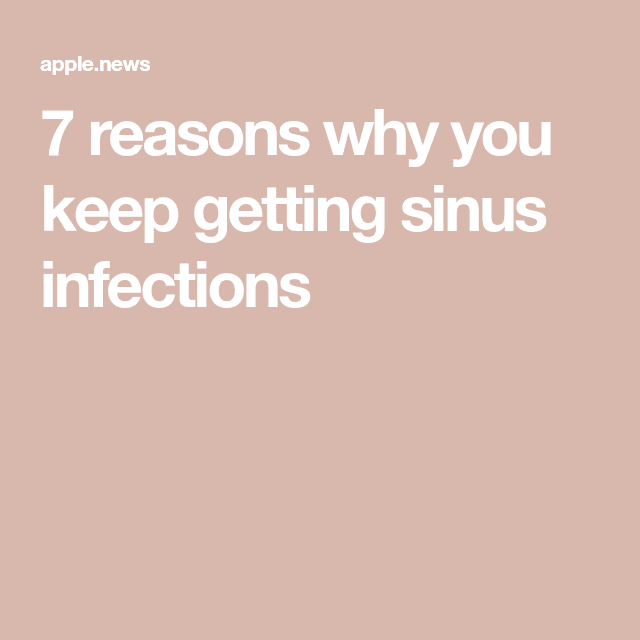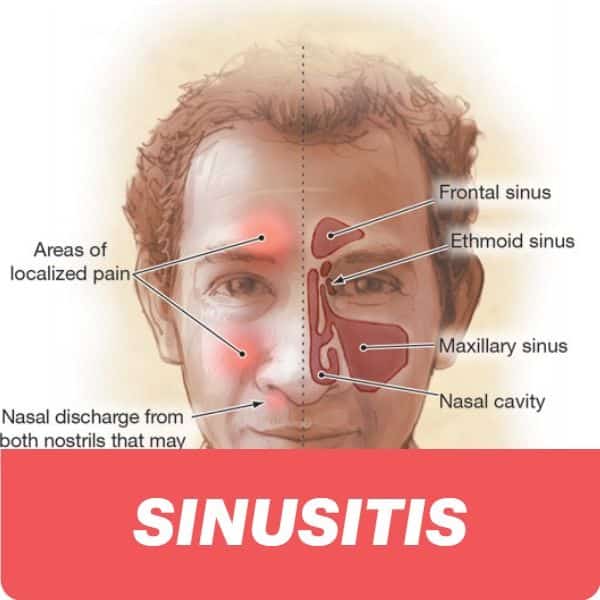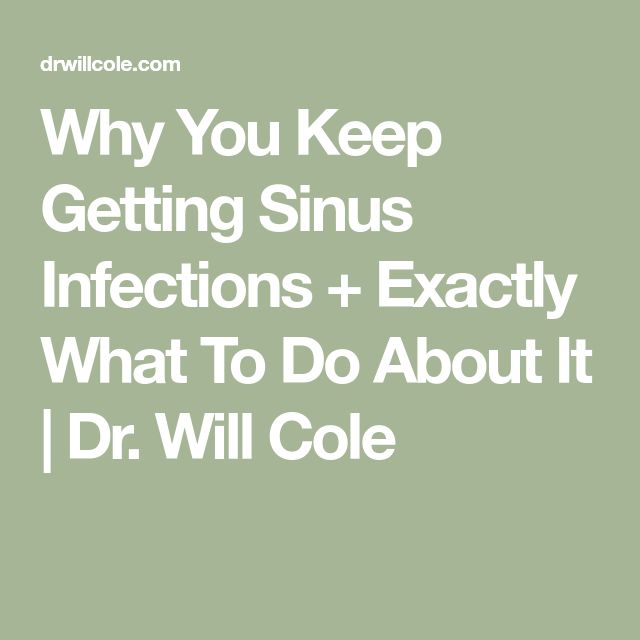Battling Recurrent Sinus Infections
Sinus disease is a major health problem. Americans spend more than $1 billion each year on over-the-counter medications to treat it. People who have allergies, asthma, or structural blockage in their nose or sinuses and people with a weak immune system are at greater risk. People who smoke or who are exposed to tobacco smoke get sinus infections more frequently than non-smokers, and smokers respond less well to treatment than non-smokers.
A bad cold is often mistaken for a sinus infection. Many symptoms are the same, including headache, facial pain, runny nose and nasal congestion. Sinus infection is often caused by bacterial infection, but sometimes it can be caused by viruses and molds. Acute sinus disease by definition can last up to eight weeks. Anything that lasts longer than eight weeks is considered chronic.
A healthy child or adult can get up to four colds a year. If you are a smoker, a day care worker, or a teacher, you might get more than this. Most colds resolve just with symptomatic treatment, but some can progress to sinus infection. One clue is that a cold will resolve in 7-10 days. A sinus infection typically lasts longer than ten days.
If underlying allergies are a contributing factor, then using allergy medications, such as nasal sprays, oral antihistamines, and even allergy shots can help to treat or prevent recurrent infections.
Why Sinusitis Keeps Coming Back
Sinus infections can be incredibly painful, and they can become debilitating if when they are not diagnosed and treated properly. The relief of a cured sinus infection quickly evaporates when the telltale symptoms of an infection return and patients are left wondering why sinusitis wont stay away. In addition to causing discomfort and/or missed days of work, untreated and recurrent sinus infections can lead to more permanent damage in the sinus cavities and nasal passages.
While the very occasional, acute sinus infection is relatively normal, recurrent or chronic sinus infections are not. If a sinus infection returns again after youve finished a round of antibiotics and/or have followed your physicians at-home treatment instructions to the letter, please schedule another appointment ASAP.
You may need a referral to an ENT specialist to determine why the sinus infection continues to come back, and whether anatomical corrections may be necessary to fix the problem once and for all.
Why Do My Sinuses Keep Getting Infected
Here comes the sneezing, runny nose, and headaches..again. You can tell that its probably a sinus infection by that inflamed clogged feeling behind your nose.
Repeated sinus infections can be a considerable problem for people that cope with them, resulting in miserable days in bed . As unpleasant as a sinus infection is, it cant always be treated with antibiotics.
Don’t Miss: Best Relief For Sinus Infection
How Is Sinusitis Diagnosed
Often, your healthcare provider can diagnosis sinusitis based on your symptoms and a physical exam. Sometimes other tests are done. These may include:
-
Cultures from the nose
-
Sinus computed tomography . This imaging method uses X-rays and computer technology to make images of the body.
Your healthcare provider will figure out the best care based on:
-
How old you are
How Can I Prevent A Sinus Infection

One of the best ways to prevent chronic sinusitis is to avoid the initial infection. Follow these tips:
- Wash your hands often with soap and water for a least 20 seconds, especially when coming into contact with commonly used surfaces. If soap and water are not available, use a hand sanitizer.
- Avoid anyone with a cold, flu or other respiratory illness.
- Stop smoking or avoid secondhand smoke.
If you have a sinus infection, stay home, if you can. Remember to practice the following safety measure so that you avoid making others sick:
Also Check: How To Take A Zpack For Sinus Infection
Why Do I Always Get Sinusitis
Its possible for an acute sinus infection to develop into a chronic infection over time. However, most chronic sinus infections are caused by: Problems with the physical structure of your sinuses such as nasal polyps, narrow sinuses, or a deviated septum. Allergies such as hay fever that cause inflammation.
Is It A Cold Or A Bacterial Sinus Infection
A good way to identify a sinus infection becoming serious is to find out what type of sinus infection you have. A sinus infection could be viral or bacterial. Swabbing inside of the nose and growing culture is recommended to test which type it is. Viral sinus infections can normally be treated with liquids, rest, and an anti-inflammatory such as ibuprofen. However, bacterial infections are considered to be more lingering and will need to be treated by your doctor.
You May Like: Ways To Reduce Sinus Inflammation
Whats A Sinus Infection
Your sinuses are four connected, hollow cavities inside your face. Youll find them just behind your nose two right above your eyebrows and two below your eyes.
Normally, your sinuses are filled with air. Since their job is to produce the mucus that lines the inside of your nose, theyre bordered by tiny hairs called cilia that are constantly sweeping mucus through the area and down your throat.
Sometimes, however, the linings of your sinuses become inflamed. This makes it difficult for the mucus to drain properly, and can cause it to back up. This, in turn, creates the perfect environment for germs to grow, leading to you guessed it a sinus infection.
What Can I Do About Recurring Sinus Infections
So many people across the United States and even the world are dealing with painful sinus symptoms and living with chronic sinusitis. Sinus infections are not only painful they are also distracting. They can put you in a sour mood, impact your relationships and just make life more difficult to navigate. Symptoms like headaches, fatigue, and sinus pain can impact careers, family time, sleep, trips, and so much more.
Don’t Miss: Sinus Infection Spread To Ear
How Should I Treat My Sinus Infection
A mild, one-time infection should be handled much differently than a sinus infection that wonât go away or keeps coming back. But, even mild infections can become more serious as time goes on, and for the best results, they should be monitored and treated by an ENT. A minor sinus infection treatment may consist of:
- At home remedies: Many are searching for ânatural cures for sinus infectionâ. At home remedies are often not successful at getting to the root of the problem, but they may be helpful in easing the severity of your symptoms. Sufferers have found that warm compresses and humidifiers are very helpful.
- Antibiotics: Sinus infection antibiotics can only be successful when patients are suffering with a bacterial infection. In order to understand what kind of infection you may have, it is important to contact your ENT so they can prescribe you antibiotics when appropriate.
- Sinus Medication: Sinus infection medication may consist of nasal sprays, decongestants, and more. They are helpful to ease the symptoms but are not a long-term solution to chronic sinusitis.
For more severe infections, or chronic sinusitis, many sufferers have tried at home remedies, antibiotics and infection medications with no luck. When this is the case, patients may have to turn to more permanent solutions:
Treatment Options For Chronic Sinus Infections
If youre tired of dealing with recurring sinus infections, you should talk to your doctor about more permanent solutions. Antibiotics, steroids, OTC medications, and home remedies can only go so far when youre prone to infection.
Luckily, you have options when it comes to treatment. If you have nasal polyps or bone spurs causing congestion in your sinuses, surgery to remove these obstructions can prevent future infections.
You May Like: How To Take Mucinex Sinus Max
Cpap And Sinus Infections
One of the more common complaints from CPAP users is that they are prone to sinus infections. Typically, they deal with it using saline irrigation, decongestants, and sometimes even go to their doctor for antibiotics. As a result, people suspect contamination or infection from their equipment, especially the mask, tubing or even the machine itself. Other suspects include molds, allergies or even sensitivity to their masks.
I had an experience today with a patient that makes me rethink how CPAP may aggravate nasal or sinus infections. This patient was unable to use CPAP after 4-5 days because his nose and sinuses would burn. He interpreted this as an infection. His numbers and other compliance parameters were perfect. While performing nasal endoscopy he commented that the sensation was identical to the feeling that he experienced when he used CPAP.
That got me thinking about how most cases of sinus headaches and pain have been shown to be a variation of a migraine. This is a neurologic reaction to any sort of irritation or stimulation. If you were to undergo a CAT scan during an episode, youll see that in most cases, itll be completely normal. Unfortunately, too many people end up being given oral antibiotics.
Do you get recurrent sinus infections when you use your CPAP?
How Can I Prevent Sinusitis

Experts dont know a lot about how to prevent sinusitis. But the following tips may help:
- Avoid contact with allergens or irritants that trigger your nasal allergies.
- Keep your nose as free and clear as possible by taking your allergy medicines including topical nasal steroid sprays and using a nasal saline rinse.
- Avoid infections by washing your hands often during common cold season. Also avoid touching your face.
- Talk with your doctor about lifestyle changes that may help you prevent repeated sinus infections. These may include changes to your diet, maintaining good hydration, performing regular exercise, and reducing stress.
Medical Review: April 2021 by Sarah Goff, MD, PhD, and August 2022 by John James, MD
Allergy Symptoms
Recommended Reading: Can A Sinus Infection Cause Diarrhea In Adults
What Are The Treatment Options
Sinusitis is treated differently based on the cause. Most cases of acute sinusitis, about 98 percent, are caused by a virus, not bacteria, and should not be treated with antibiotics. Acute viral sinusitis may be treated using pain relievers such as acetaminophen or ibuprofen, steroid nasal sprays, or salt water irrigation in the nose. These treatments are also good options for acute bacterial sinusitis. Most people get better naturally from acute bacterial sinusitis, called watchful waiting, but some patients with acute bacterial sinusitis may get better faster with an antibiotic.
Chronic sinusitis is treated differently than acute sinusitis. Because chronic sinusitis is caused more by inflammation than infection, the treatments for chronic sinusitis aim to control the inflammation. Salt water nasal irrigation and/or nasal steroid sprays are the main treatments for the symptoms of chronic sinusitis. Antibiotics may sometimes be helpful but not always.
Other factors, including allergies, nasal polyps, asthma, and problems with the bodys ability to fight infections, can go along with sinusitis and make it worse unless they are also treated.
X-rays or CT scans of the sinuses are not necessary to diagnose uncomplicated sinusitis if you have the symptoms of sinusitis . If your doctor suspects a complication or if you have repeated episodes or prolonged sinus symptoms, a CT scan of your sinuses may be needed.
Surgery
css id:
Frequent Sinus Infections Why Your Sinusitis Keeps Coming Back
Los Angeles residents who struggle with frequent sinus infections often experience nasal congestion, constant sinus drainage, general discomfort, and recurrent fatigue. There are reasons why your sinusitis might keep coming back, and its important to get to the root cause when figuring out a solution.
Also Check: How To Heal A Sinus Infection Without Antibiotics
Whats The Best Medication For A Sinus Infection
Treating a sinus infection depends on its underlying cause. If your sinus infection hasnt improved around day seven, it may be the result of a bacterial infection. In these cases, your doctor will likely write you a prescription for an antibiotic like amoxicillin .
Or, if you have a penicillin allergy, they might choose levofloxacin . Azithromycin was a go-to, but it isnt recommended these days due to high rates of resistant bacteria.
However, most sinus infections arent bacterial, so antibiotics wont work. Often, sinusitis is the result of a virus, nasal polyps causing a blockage, or allergies triggering inflammation. In these cases, treatment should instead center on addressing symptoms and treating the underlying cause.
To help with any soreness and discomfort, take an over-the-counter pain reliever like ibuprofen or acetaminophen . And, you can use a saline rinse or neti pot to help you flush out all that snot and relieve some of the discomfort. Just make sure to use sterile or bottled water instead of tap to avoid other problems like amebic encephalitis thats right, brain-eating amoebas.
For temporary relief of congestion, you can opt for blowing your nose in a steamy shower. Steaming your face with a clean mould-free source, regularly applying a wet and warm cloth to it, and sleeping with a couple of pillows underneath you to elevate your head is also helpful.
If You Are Exposed To Pollutants You Might Get Chronic Nasal And Sinus Inflammation
The environment that you live or work in may be contributing to frequent sinus infections, especially if you are exposed to pollutants on a regular basis.
Based on the findings from a 2017 study, researchers at Johns Hopkins found a connection between continuous exposure to pollution and chronic nasal and sinus tissue inflammation. This study was done on mice, though the consequences seen in the mice were said to mimic human chronic sinusitis. Previous studies, however, have found correlations between exposure to air pollution and blocked sinuses, which can lead to sinusitis.
If the symptoms of a sinus infection persist beyond 10 days, Daneshrad said you should seek the aid of a physician.
“If a course of antibiotics does not resolve the infection or if infections recur frequently, then you should be seen by a specialist to determine if there is a physical blockage of the sinuses,” he added.
Read Also: Do You Need An Antibiotic For Sinus Infection
What Are The Causes Of Sinusitis
The sinuses are lined with membranes that produce mucus. When someone has a cold or allergies, the nasal passages as well as the sinus tissues become swollen and make more mucus. As a result, mucus that normally flows smoothly can get blocked and become trapped in the sinuses. It becomes a breeding ground where bacteria, viruses, and fungi can thrive, resulting in sinusitis.
You Want Additional Treatment Options
When all the treatments dont seem to be helping, you need some options and an ENT specialist will be able to provide that care. Maybe you have been on antibiotics for a while, and although sometimes they can help, there are times they dont.
A specialist may prescribe a combination of treatments. They can determine if the infection is bacterial or instead an uncontrolled inflammation which may require other care.
Dont Miss: Best Medicine For Severe Sinus Pressure
Don’t Miss: Best Antibiotic For Sinus Infection And Cough
Treatment For Sinus Infection
Whether you have an acute sinus infection or a chronic infection, a number of treatment options can relieve your discomfort. If youre in the early stage of an acute sinus infection, it may be appropriate to start at-home treatments while you monitor your symptoms. If your sinusitis worsens, youll need to call your doctor for medication and further care. Even if youre receiving treatment from your doctor, at-home care can help ease your symptoms.
Sinus Infection & Sinusitis Have Different Causes

Despite being commonly known as a sinus infection, the symptoms of sinusitis are not always caused by an infection. Repetitive sinus infections can be a sign of seasonal allergies or structural problems that make the sinus and nasal lining swell. Therefore, recurrent or persistent sinus infections dont usually respond to antibiotics.
If youre suffering from a persistent or recurrent sinus infection, dont wait! The earlier you reach out for help, the earlier youll be able to breathe freely again. Confirm an appointment with Dr. Pasha today!
Also Check: How To Treat A Sinus Infection At Home Naturally
Complications Of Sinus Infection
Sinus inflammation can spread to the bones and soft tissues of the face and eyes. This can cause:
- Cellulitis of the face or around the eyes
- Abscesses of the eyes
Left intreated, sinus infections can also lead to serious intracranial complications, including blood clots within the cavernous sinus, pus between the skulls and dura mater , and meningitis.
Also Check: Does Amoxicillin Clear Up Sinus Infections
Avoiding Persistent Sinus Infections
In order to stop the development of a sinus infection from developing, there are some things you can do around the house. Here are some of the most common and easiest:
- Drink a lot of water. Again hydration is key here: your mucus membranes wont dry out as easily when youre hydrated.
- Regularly clean clothing and surfaces completely.On the one hand, this helps eliminate germs. But perhaps, more importantly, vacuuming, washing your sheets, and all that can help keep allergens away. Youll breathe a lot easier if theres a minimum of pet dander or dust on your sheets. So your sinuses wont get plugged as frequently.
- Run a humidifier when you can. This will help keep that dry air away.
- Wash your hands regularly. Its good hygiene, and it can help counter the spread of germs that are responsible for infections.
- Take a warm shower with plenty of steam! This will help rejuvenate or relieve those mucus membranes when youre coping with that dry air.
Read Also: How To Get Rid Of Sinus Headache Naturally